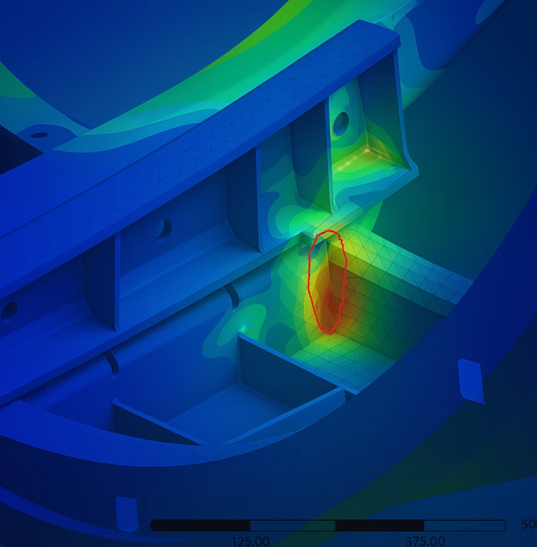
STRUCTURAL ANALYSIS
Structural analysis is essential for validating the strength, stability, and reliability of mechanical components under operational loads. At MSS Design, we deliver simulation-driven insights using advanced Finite Element Analysis (FEA) techniques.
Core Capabilities:
- Static Structural Analysis: Evaluate stress, strain, and displacement under applied forces or pressure.
- Linear & Nonlinear Behavior: Model both elastic and plastic deformation for a wide range of materials and load cases.
- Rigid Body Dynamics: Simulation of motion, force transmission, and constraint behavior in multi-body systems
- Buckling Assessment: Analyze structural stability under compressive loads to prevent sudden collapse.
- Design Optimization: Improve material efficiency while meeting safety and performance requirements.
Our structural analysis services help engineers build safer, lighter, and more cost-effective products through accurate virtual testing.

VIBRATION AND FATIGUE ANALYSIS
Vibration in mechanical systems can be broadly categorized into harmonic (periodic) and random (stochastic) types, both of which induce cyclic stresses on components. These cyclic loads are a primary cause of fatigue damage, where repeated stress variations initiate microcracks that progressively grow, ultimately leading to structural failure. Our vibration analysis identifies the nature and sources of these oscillations through advanced signal processing techniques such as FFT and time-frequency analysis, enabling early detection of faults like imbalance, misalignment, and bearing defects.
By integrating vibration data into our fatigue analysis models, including stress-life (S-N) and fracture mechanics approaches, we accurately predict crack initiation and propagation under realistic loading spectra. This comprehensive approach allows us to estimate the service life and overall lifecycle of your components and systems.
Understanding the direct link between vibration-induced cyclic stresses and fatigue failure is crucial for effective lifecycle management. Our combined analysis services enable optimized maintenance planning, improved design durability, and extended operational life, helping you reduce downtime and lifecycle costs.

ELECTRONICS COOLING ANALYSIS
Efficient thermal management is essential for reliable electronic system performance. Our electronics cooling analysis involves:
- Thermal simulation (CFD/FEM): Accurate modeling of heat generation and dissipation within enclosures, PCBs, and components.
- Component-level heat analysis: Identification of critical hotspots in power electronics, processors, and ICs.
- Cooling strategy evaluation: Comparison of passive (heat sinks, natural convection) and active (forced air, liquid cooling) methods.
- Design optimization: Thermal interface material (TIM) selection, airflow path improvement, and layout modification.
We help engineers reduce junction temperatures, avoid thermal throttling, and meet design limits under worst-case thermal loads.